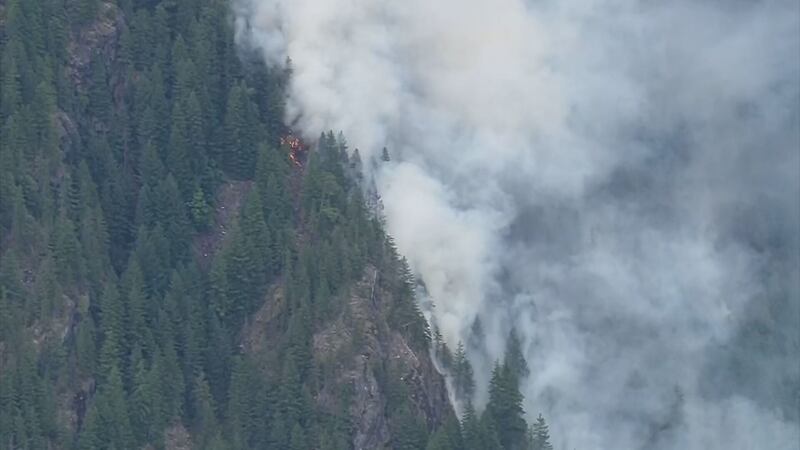While Western Washington has largely had a quiet fire season in terms of poor air quality, smoke is expected to bring the region’s air quality of the year so far.
>>KIRO 7 Meteorologist Morgan Palmer explains how we predict smoke forecasts in your area
According to KIRO 7 Pinpoint Meteorologist Nick Allard, winds will likely turn out of the northeast on Saturday and continue through Monday. Those winds will bring smoke from a smattering of wildfires both in Washington and across the border in Canada.
While a lot of distant wildfire smoke would tend to stay higher in the atmosphere, the fires in the Washington Cascades are close enough that surface air quality will likely deteriorate. That will start Saturday afternoon, with the worst air quality expected between Sunday and Monday.
According to the latest forecast, the AQI rating for much of the region between Everett and Tacoma will be in the moderate range, posing a potential risk for people who are unusually sensitive to air pollution. Further north and east, air quality will be in the “unhealthy for sensitive groups” category. Closer to the fires burning right now the AQI will be unhealthy for some members of the general public.
Wildfire smoke is expected to impact Puget Sound’s air quality over the weekend. The air quality will likely reach MODERATE or UNHEALTHY FOR SENSITIVE GROUPS on Saturday; and UNHEALTHY or worse at times on Sunday. Limit your exposure outside and use air purifiers, if available. pic.twitter.com/XVcJz7JkrR
— Puget Sound Clean Air Agency (@pscleanair) August 18, 2023
These numbers come amid a busy week for fire crews across the Puget Sound region, fueled by 90-degree temperatures and dry weather. That included a massive three-alarm fire at Fort Steilacoom Park on Wednesday that had many residents in the area asked to evacuate. Hours later, a home in Green Lake went completely up in flames. Earlier in the week, a fire went up at a homeless encampment in Seattle after a lit candle was knocked over inside a tent.
Dry conditions have had burn bans in effect throughout Western Washington. That includes Skagit, Whatcom, King, Island, and Snohomish counties among others.
It is important to remember that forecasts for smoke often change significantly as a slight deviation in forecast wind versus actual wind as well as fire growth or suppression change the amount of smoke a given area will receive.
©2023 Cox Media Group








